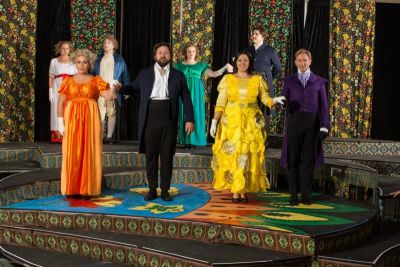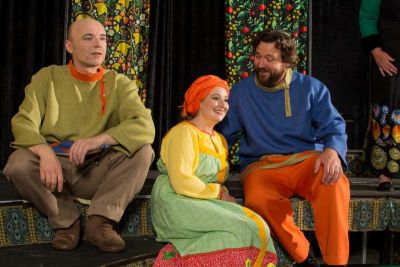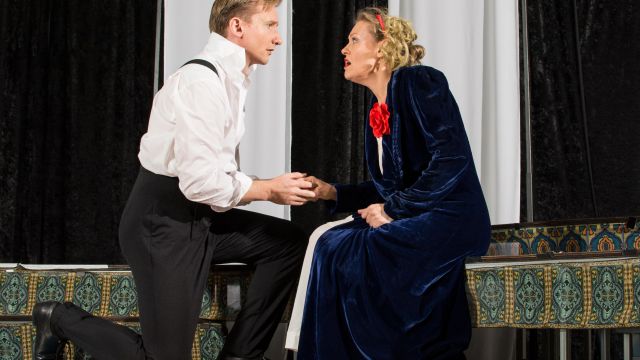Eugene Onegin
Most theatregoers know Tchaikovsky’s ballets,Swan Lake and The Nutcracker Suite. Eugene Onegin is his most famous opera among avid opera lovers but remains little known generally. Co-Opera has given this opera much love and attention to detail in its most lavish and ambitious production yet.
A lyric opera, it is packed with dramatic moments and very closely follows Alexander Pushkin’s novel, but in verse.
Set the 1820s, in the countryside of Russia, the story is simple.Tatyana, the daughter of a landowner, is enjoying an outing with her younger sister Olga. Olga’s fiancé, the poet Lensky, visits with his friend Eugene Onegin, a sophisticated, intelligent man.
Tatyana falls in love with him at once and stays up all night writing a long love letter. Onegin however confronts her and confesses he merely wants to be a friend.
Some months later a ball is held in Tatyana’s house. Onegin attends the ball with Lensky. He feels trapped by the huge party and takes revenge by trying to seduce Olga. The consequences of this are long-term and tragic.
There are many aspects of this production that are to be commended.
 The orchestra plays a crucial role in any opera. Musical Director Brian Chatterton’s task of ensuring an arrangement retains all the elements of the full score with only eleven players is immense. Chatterton’s orchestra is tight and produces an amazingly full sound for so few players.
The orchestra plays a crucial role in any opera. Musical Director Brian Chatterton’s task of ensuring an arrangement retains all the elements of the full score with only eleven players is immense. Chatterton’s orchestra is tight and produces an amazingly full sound for so few players.
Director Tessa Bremner’s staging concept and direction helps the performers do more than just stand and sing. They pour out their emotions and make the story totally believable. The multi-level stage and simple sets keep the action flowing smoothly.
Karen Fitz-Gibbon’s Tatyana is a lesson in acting for all opera singers. She runs the gamut of emotions and masters the difficult art of stillness on stage. Her aria in Act 1 is a test for any soprano. She maintains the stamina required and, on the night I attended, earned a well-deserved ovation from the audience. A little more volume in some of the sections with full orchestration will ensure that all her lyrics are heard.
Eugene F. Raggio’s voice is as smooth as hot chocolate. His command of the baritone range demanded of the title role is impressive. For me, his performance in the Act 3 duet was powerful and drove the emotion of this pivotal piece.
Michael Butchard is suitably tortured as the insecure poet Lensky. His aria in Act 2 is a standout and allows him to demonstrate the full range of his tenor voice.
 Bronwyn Douglass as Olga, Deborah Johnson as Larina and Joshua Rowe as Prince Gremin all give solid performances in their respective roles, particularly Joshua Rowe, who, when I attended, impressed the audience with his bass aria in Act 3.
Bronwyn Douglass as Olga, Deborah Johnson as Larina and Joshua Rowe as Prince Gremin all give solid performances in their respective roles, particularly Joshua Rowe, who, when I attended, impressed the audience with his bass aria in Act 3.
Two highlights for me were Meran Bow as Filipyevna, the old nanny of Tatyana, and Branko Lovrinov as Monsieu Triquet. Both accomplished actors and singers, they held the audience’s attention whenever they were onstage. Bow’s voice is rich, full and well suited to the character. Lovrinov’s cameo as a foppish nobleman was a real crowd pleaser.
I particularly enjoyed the Co-Opera tradition of singing the important arias in their original language (with surtitles). In this opera, these arias were in Russian.
My only criticisms were that the stage creaked when walked upon and, from where I sat, the orchestra overpowering the singers at times.These problems are almost unavoidable though, as the production has to tour and the set needs to be constructed to be portable, however it did distract at times. The venue (The Thomas Edmunds Opera Studio) has acoustic problems and without an orchestra pit it is hard to always achieve perfect balance.
Co-Opera is to be congratulated for bringing this little known Russian gem to Adelaide audiences with such style and panache.
Barry Hill
Subscribe to our E-Newsletter, buy our latest print edition or find a Performing Arts book at Book Nook.

